A group of coaches gathered recently to consider the competency the ICF calls “Evoking Awareness.” Much of this competency involves asking (or otherwise inspiring) clients to think of their own situations from new perspectives. But most coaches worry that they won’t know what to ask to accomplish this.
In practice, what to ask is probably less important than developing a way to know when to ask. Most insights require follow up: one question may produce an insight, but turning that into a persistent thought usually involves considering the insight itself from multiple points of view.
How do you know when someone requires help expanding their awareness and when someone requires space to reflect or trace their own thoughts?
You probably don’t. That’s why you test. You work with metaphors, silence, or generalized language to keep the conversation going while you observe responses. Don’t ask an important question until you’re sure that you have both attention and permission.
We all want to rush. We all want to push through to a solution or inspire a breakthrough. Our brains have evolved for pattern recognition, and when we see a pattern, we want to share it. But it’s hard to keep two brains in sync and your flash of insight might be brilliant and still not be what the person you are coaching needs.
When should you ask? When you have a pattern of connection that suggests the other person is ready for another new perspective.



